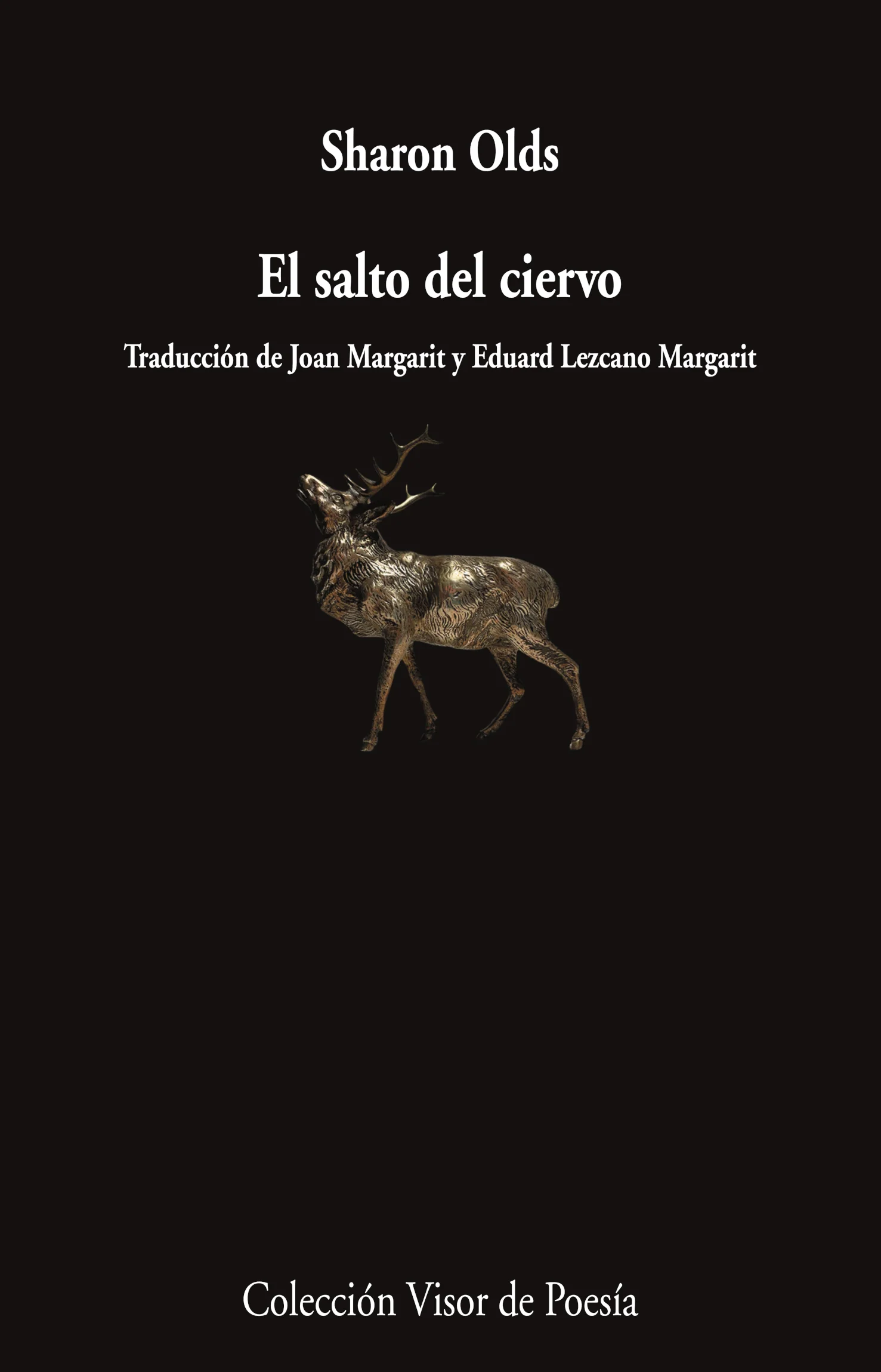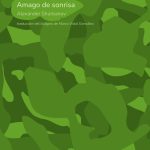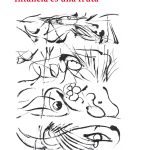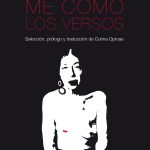En este poemario, Sharon Olds relata la historia de una separación, que empieza una noche de invierno en un dormitorio de matrimonio y se extiende hasta años más tarde. La presente traducción, la última realizada por Joan Margarit antes de su muerte en 2021, pretende recordar y celebrar la honda amistad que unió a estas dos voces poéticas que cantaron desde y para la vida a ambos lados del Atlántico.
En Zenda ofrecemos cinco poemas (en la lengua original y en la traducción) de El salto del ciervo (Visor).
***
THE LAST HOUR
Suddenly, the last hour
before he took me to the airport, he stood up,
bumping the table, and took a step
toward me, and like a figure in an early
science fiction movie he leaned
forward and down, and opened an arm,
knocking my breast, and he tried to take some
hold of me, I stood and we stumbled,
and then we stood, around our core, his
hoarse cry of awe, at the center,
at the end, of our life. Quickly, then,
the worst was over, I could comfort him,
holding his heart in place from the back
and smoothing it from the front, his own
life continuing, and what had
bound him, around his heart—and bound him
to me—now lying on and around us,
sea-water, rust, light, shards,
the little eternal curls of eros
beaten out straight.
*
LA ÚLTIMA HORA
De pronto, en el último momento,
antes de que él me llevara al aeropuerto, se levantó
chocando con la mesa y dio un paso
hacia mí, y como un personaje en una antigua
película de ciencia ficción, se inclinó
hacia delante y hacia abajo, extendió un brazo
golpeando mis pechos e intentó
agarrarse a mí. Me puse en pie y tropezamos,
y entonces nos detuvimos alrededor de nuestro núcleo, su
ronco grito de temor, en el centro,
en el final de nuestra vida. Rápidamente, entonces
—lo peor había ya pasado— pude consolarlo,
manteniendo desde la espalda su corazón en su sitio
y por delante tranquilizándolo, su propia
vida continuando, y lo que lo había
atado, en torno a su corazón —y que lo había atado
a mí— ahora yacía sobre nosotros y a nuestro alrededor,
agua de mar, óxido, luz, esquirlas,
los pequeños eternos rizos de eros
golpeados hasta quedar tiesos.
***
THE HEALERS
When they say, If there are any doctors aboard,
would they make themselves known, I remember when my then
husband would rise, and I would get to be
the one he rose from beside. They say now
that it does not work, unless you are equal.
And after those first thirty years,
I was not the one he wanted to rise from
or return to—not I but she who would also
rise, when such were needed. Now I see them,
lifting, side by side, on wide,
medical, wading-bird wings—like storks with the
doctor bags of like-loves-like
dangling from their beaks. Oh well. It was the way
it was, he did not feel happy when words
were called for, and I stood.
*
LOS CURANDEROS
Cuando dicen: Si hay médicos a bordo
por favor que se identifiquen, me acuerdo de cuando mi entonces
marido se levantaba, y yo tenía el privilegio de ser
aquella de cuyo lado él se levantaba. Ahora dicen
que no funciona si no eres una igual.
Y después de esos primeros treinta años,
yo ya no era aquella de cuyo lado él deseaba levantarse
ni hacia quien volver, no yo sino ella que también
se levantaría cuando esos personajes fueran necesarios. Ahora los veo,
elevándose, una al lado del otro, sobre anchas,
clínicas, alas de aves zancudas como cigüeñas con los
maletines de médico colgando de sus picos,
signo de que un igual ama a una igual. Oh bueno. Fue como
fue, él no se sentía feliz cuando a la hora de las palabras
era yo quien se ponía en pie.
***
THE EASEL
When I build a fire, I feel purposeful—
proud I can unscrew the wing nuts
from off the rusted bolts, disassembling
one of the things my ex
left when he left right left. And laying its
narrow, polished, maple angles
across the kindling, providing for updraft—
good. Then by flame-light I see: I am burning
his old easel. How can that be,
after the hours and hours—all told, maybe
weeks, a month of stillness—modeling
for him, our first years together,
odor of acrylic, stretch of treated
canvas. I am burning his left-behind craft,
he who was the first to turn
our family, naked, into art.
What if someone had told me, thirty
years ago: If you give up, now,
wanting to be an artist, he might
love you all your life—what would I
have said? I didn’t even have an art,
it would come from out of our family’s life—
what could I have said: nothing will stop me.
*
EL CABALLETE
Cuando hago un fuego, me siento útil,
orgullosa desenrosco las tuercas
de los tornillos oxidados al desmontar
una de las cosas que mi ex
dejó cuando me dejó correcto me dejó. Y dejando sus
estrechos, pulidos ángulos de arce
sobre la leña, para las corrientes de aire ascendentes,
bien. Entonces a la luz de las llamas lo veo: estoy quemando
su antiguo caballete. Cómo puede ser,
después de horas y horas en total, quizá
semanas, un mes de silencio, posando
para él, nuestros primeros años juntos,
el olor a acrílico, la tensión del lienzo
tratado. Estoy incinerando el oficio que dejó atrás,
él que fue el primero en convertir
nuestra familia, desnuda, en arte.
Y si alguien me hubiese dicho, hace treinta
años: si abandonas, ahora,
el deseo de ser artista, puede que él
te ame toda tu vida —¿Qué hubiese
dicho yo?— Ni siquiera tenía un arte,
este saldría de nuestra vida familiar.
¿Qué podría haber dicho? Nada me detendrá.
***
DISCANDIED
When my hand is groping on the toolroom shelf for exmarital
liquor to drink by myself,
it bumps something it knows by one bump
and rustle, one chocolate bar with almonds, then the
muffled thunk of another—he would hide them,
then give me one when I was sad. When he left,
he did not think, as who would,
to go to the caches and empty them, to the
traps and spring them. I take the fascia
of bars to the compost, denude them of their peel,
and chuck them in with the rumps and grinds,
the grounds and eden rinds,
and I carry the bowl outside, to the heap,
and trowel a pit in some eggshell crunch where the
potato sends its crisp shoots
of rage up, I tuck the cocoa
shards in—vanillin to vanillin,
very nut to very nut,
and remember how he hated it
when I tried to get him to talk to me,
tried with a certain steadiness—
nagged him to reveal himself—
maybe these desserts were not only gifts,
but bribes or stops, to close my mouth
an hour on sweetness.
*
DESCARAMELIZADA
Cuando mi mano tantea por el estante del cuarto de las herramientas
buscando el licor ex-marital para beber sola,
choca con algo que conoce al mínimo contacto
y crujido, una tabla de chocolate con almendras, después el
sonido amortiguado de otra, él solía esconderlas,
para darme una cuando estuviese triste. Cuando se fue,
no pensó en esto, quien iba a hacerlo,
ir a los escondites y vaciarlos, a las
trampas y hacerlas saltar. Cojo el envoltorio
con las tablas y las llevo a la basura orgánica, las desnudo de sus pieles,
y las arrojo junto con las sobras y los restos triturados,
las tierras y las cortezas del Edén,
y llevo el cuenco fuera, a la pila,
y cavo un hoyo en una aplastada cáscara de huevo donde la
patata manda sus crujientes disparos
de rabia hacia arriba, introduzco los fragmentos
de cacao, vainilla a vainilla,
las nueces una por una,
y recuerdo cuánto odiaba él
que yo intentara que me hablase,
yo lo intentaba con una cierta constancia,
lo incordiaba para que se revelase a sí mismo,
quizá estos postres fueron no solo regalos,
sino sobornos u obstáculos para cerrar mi boc
durante una hora usando la dulzura.
***
I’D ASK HIM FOR IT
Rarely, he would sing to me,
I don’t know what scale he used, maybe Arab,
seventeen steps to the octave, or Chinese,
five. It was microtonal, aharmonic,
its staff was of the bass clef,
but I don’t know how far below baritone
it went, C below middle C or
lower, down into those mineral regions—I would
ask it of him directly, I would be
lying along him, and would say to him,
softly, confiding, “Do me some low notes,” and he’d
open his wide, thin-lipped, tone-deaf
mouth, and seek down, for a breath
near the early deposited shales,
he would make the male soundings, and if I had been
finishing, I would again, central
level bubble of a whole note slowly
bursting. I think he loved being loved,
I think those were the cadences,
plagal, of a good, lived life.
He liked it a long time, tonic,
dominant, subdominant, and now
I want to relearn the intervals, to
journey with a man among the thirds and fifths,
augmented, diminished, with a light touch,
sforzando, rallentando, agitato, the usual
adores and dotes—and of course what I really
want is some low notes.
*
YO SOLÍA PEDÍRSELO
Él raramente me cantaba,
no sé qué escala utilizaba, la árabe quizá,
diecisiete pulsaciones hasta la octava, o la china,
cinco. Era microtonal, inarmónica,
su pentagrama era de clave baja,
pero no sé cuánto más baja que el barítono
iba, el do por debajo del do medio o
más bajo, descendiendo hacia aquellas regiones minerales, yo solía
pedírselo directamente, tumbada
a lo largo de él, y diciéndole,
suavemente, en confianza, «Hazme algunas notas graves»,
y él
abría su amplia boca, de labios delgados, sin oído musical,
y buscaba en las profundidades un aliento
cerca de los primeros yacimientos de pizarra,
haciendo los sonidos masculinos, y si yo hubiese estado
terminando, lo haría otra vez, una nota entera
surgiendo lentamente como la burbuja central
de un nivel. Creo que él amaba ser amado,
creo que esas eran las cadencias,
plagales, de una buena, vivida vida.
A él le gustó durante mucho tiempo, tónica,
dominante, subdominante, y ahora
yo quiero volver a aprender los intervalos,
viajar con un hombre entre las terceras y las quintas,
aumentadas, disminuidas, con un toque ligero,
sforzando, rallentando, agitato, las habituales
adoraciones y consentimientos, y evidentemente lo que yo realmente
quiero son algunas notas bajas.
—————————————
Autor: Sharon Olds. Título: El salto del ciervo. Traducción: Joan Margarit y Eduard Lezcano Margarit. Editorial: Visor. Venta: Todos tus libros.
BIO
Sharon Olds (San Francisco, 1942) es una de las grandes poetas de nuestro tiempo y seguramente lo siga siendo cuando nuestro mundo ya sea otro. Sus poemas no son sencillos, pero las palabras y las imágenes que los construyen pertenecen a un territorio familiar para cualquier persona. Mientras existan el amor y el dolor, la poesía de Sharon Olds seguirá emocionando a quien la lea. A lo largo de los años, la poesía de Sharon Olds ha recibido la admiración de la crítica y el calor de los lectores.






Me encantó,este Poemario de cinco poesías, felicidades a ustedes por traernos esta Poeta.
Ver a través de las palabras,no solo lo físico,sino su mundo interior, dejándonos satisfecho en cada prosa.